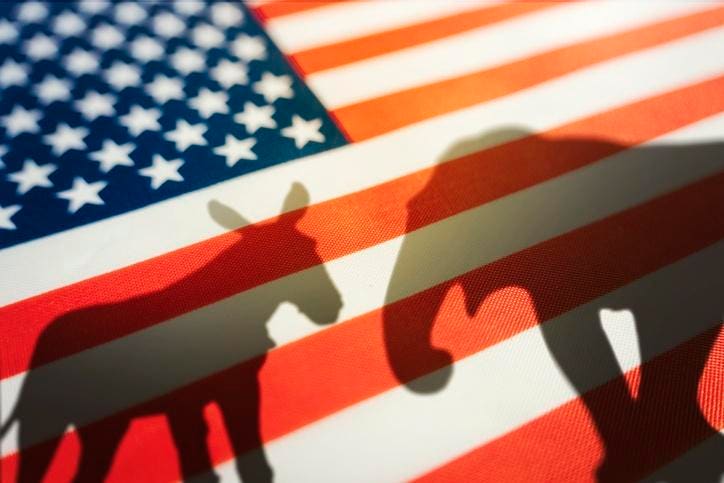The upcoming election is only days away, and the two presidential candidates remain in a statistical dead heat. Control of the U.S. Congress seems likely to be narrow as well, with either party having a chance to win control. Clearly, the electorate is deeply divided, and it is increasingly rare to find issues that transcend party lines. According to Gallup, polarization between Republicans and Democrats on social and policy matters has surged significantly in the past two decades.
But amidst this political division, Americans are notably united in concerns about their economic security in retirement. In fact, a recent nationwide survey of Americans reveals that despite the widening gap in political ideology, Democrats, Republicans, and Independents share common worries about their future financial security, while also largely agreeing on potential solutions. Across party lines, Americans are deeply concerned about their ability to retire comfortably, and they feel that policymakers must act swiftly to address the looming crisis.
A Nation United in Retirement Worries
Retirement concerns are not just theoretical for most Americans—they are a daily reality. Research finds that Americans overwhelmingly believe the nation faces a retirement crisis regardless of their political party affiliation. Specifically, 81% of Republicans, 78% of Democrats, and 79% of Independents agree that the U.S. is grappling with a serious retirement problem. This shared anxiety is not without reason. Data from the Federal Reserve show that nearly half of U.S. households lack retirement savings, and of those who do, many have accumulated insufficient funds to support a comfortable retirement.
One of the most striking takeaways from the survey is that across the political spectrum, Americans are aligned in their pessimism about their financial futures. More than half of Democrats (57%), Republicans (53%), and Independents (54%) are concerned that they won’t be able to achieve financial security in retirement. The rising cost of healthcare, higher levels of inflation, and the volatility of financial markets are contributing factors, making it harder for individuals to save and invest with confidence.
Debt: A Cross-Party Barrier to Retirement Savings
Debt is another critical factor hampering Americans’ ability to save for retirement, and this is a challenge felt by members of all political parties. About 74% of Democrats, 68% of Republicans, and 68% of Independents report that their personal level of debt is problematic, with most stating that it impedes their ability to save for the future.
Debt, in many cases, has become a barrier that prevents individuals from setting aside money for retirement. Whether it’s student loans, mortgages, or credit card debt, the burden of repayment is pushing Americans’ retirement dreams further out of reach.
A Shared Desire for Employer Support and Pensions
Pensions, once a pillar of middle-class retirement security, have become a rare benefit among non-union private employers. However, across the political divide, Americans still hold pensions in high regard. The polling found that 81% of Democrats, 80% of Republicans, and 76% of Independents have a favorable view of pension plans. Many agree that pensions provide a sense of financial security that 401(k) plans simply do not offer.
Moreover, Americans across party lines believe that employers should do more to help their workers prepare for retirement. An overwhelming majority—84% of Democrats, 78% of Republicans, and 81% of Independents—agree that employers should contribute more to their employees’ retirement plans to ensure financial security in their later years. This is a clear call for employer-driven retirement solutions, with many Americans feeling that they cannot save enough on their own to secure their retirement futures.
Social Security: A Bipartisan Priority
When it comes to Social Security, the message from Americans is loud and clear: it must remain a priority. Across all political affiliations, support for Social Security is remarkably strong, with 90% of Democrats, 86% of Republicans, and 88% of Independents agreeing that the program should be preserved, regardless of the national budget deficit.
The impending financial shortfall in the Social Security trust fund is another area of bipartisan concern. Without intervention, Social Security is expected to face significant funding challenges in the coming decade. Nearly all respondents in the survey—regardless of party affiliation—believe that Congress must act now to shore up Social Security’s finances, with 89% of Democrats, 89% of Independents, and 86% of Republicans agreeing on the urgency of legislative action.
The Rising Cost of Long-Term Care
As Americans live longer, the issue of long-term care has become increasingly urgent. The research shows that the vast majority of Americans—81% of Democrats, 80% of Republicans, and 83% of Independents—are worried about the cost of long-term nursing care. The high cost of such care poses a significant financial risk to retirees, and there is broad agreement that the government should do more to help Americans access quality long-term care services.
A Path Forward: Bipartisan Solutions for Retirement Security
The message from the research is clear: retirement security is a national issue, not a partisan one. Despite the deep political divides that define so many aspects of American life today, there is broad agreement across party lines on the need for action to address the retirement crisis.
Policymakers would be wise to take note of this rare bipartisan consensus and act accordingly. Retirement security must become a legislative priority, and solutions should focus on expanding access to pensions, shoring up Social Security, and addressing the high cost of long-term care. In an era of political polarization, the shared concerns about retirement security present a unique opportunity for leaders on both sides of the aisle to come together and take meaningful action. By addressing these issues head-on, we can ensure that all Americans have the opportunity to retire with dignity and security, regardless of their political affiliation.
Read the full article here
